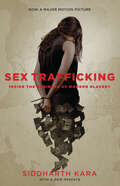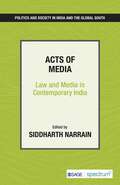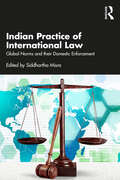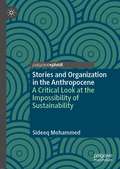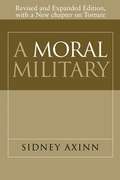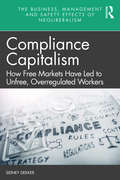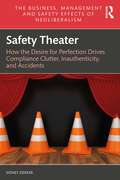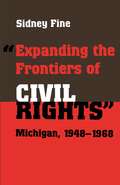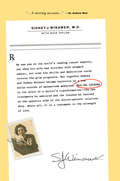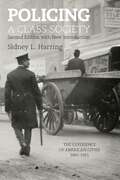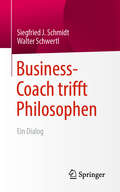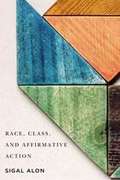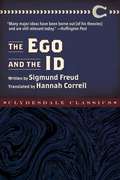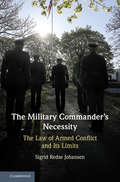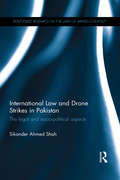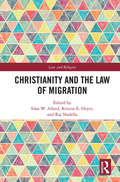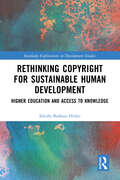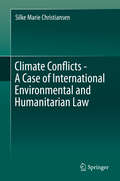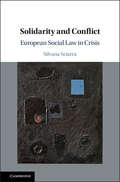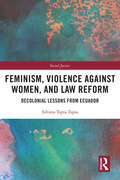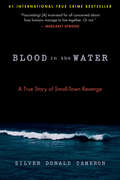- Table View
- List View
Sex Trafficking: Inside the Business of Modern Slavery
by Siddharth KaraSince the publication of Sex Trafficking in 2007, Siddharth Kara has continued to travel across countries and continents, documenting the local factors and economic forces that support sexual slavery worldwide. His riveting encounters with victims and traffickers informed his screenplay for Trafficked (2016), now a major motion picture. The film features familiar figures from Sex Trafficking and the shocking conditions of their exploitation. It also includes cases Kara has uncovered since his book debuted.This new paperback edition of Sex Trafficking includes a preface by Kara in which he discusses his findings and updates the statistics relating to his business and economic analysis of contemporary slavery. After fifteen years, Kara has recorded nearly 900 cases of sex trafficking in forty-one countries and has helped advise on numerous legal, tactical, and policy efforts for abolishing modern-day slavery across the globe. Sex Trafficking continues to lead as a resource for those hoping to expose this hidden evil and eradicate its practice once and for all.
Acts of Media: Law and Media in Contemporary India
by Siddharth NarrainActs of Media seeks to consolidate a field of multidisciplinary work around media technologies that intersects with legal scholarship. This volume brings together contributions from leading academics, lawyers, researchers and policy experts about contemporary India and Sri Lanka. The approaches to law and media taken in this volume challenge us to think outside of traditional disciplinary descriptions. Rather than approaching the law as being outside of, and constantly catching up with the media, the contributors of this book view law and media as being deeply intertwined. The chapters in this volume address the relationship between law and media through different entry points---disputes over media and information systems shaping law, theories of law that incorporate media forms, and law and media co-producing trials. The multidisciplinary nature of this book has facilitated a rich and productive conversation among legal scholars, researchers and lawyers from disciplines such as constitutional law, law and technology, media and cinema studies, legal anthropology and political science.
Indian Practice of International Law: Global Norms and their Domestic Enforcement
by Siddhartha MisraThis book engages with different aspects of India’s practice of international law. It covers a diverse range of areas such as human rights, humanitarian law, migration, diplomacy, extradition, environment, trade, investment, taxation, cyberspace, data protection, maritime, and intellectual property to showcase India’s strong commitment to respect and observe international law.The volume discusses various themes which include: Legal and constitutional framework; Air, space, and atomic energy; Environment; Sea and maritime law; Trade, investment, and taxation; Conflict of laws; IT and data protection; Human rights and humanitarian law; Issues of refugees and internally displaced persons; Extradition and diplomatic immunities; Intellectual property; International obligations. The essays in this book also establish the linkage between observance of international law and bilateral and multilateral relations between different countries.Comprehensive and analytical, this book will be useful for scholars and researchers of law, international law, human rights, and foreign policy. It will also be an invaluable companion for professionals in law firms and think tanks, bureaucrats, and diplomats.
Stories and Organization in the Anthropocene: A Critical Look at the Impossibility of Sustainability
by Sideeq MohammedThis book is about the stories being told in the Anthropocene. Stories of irreparable damage being done to the global ecosystem, of sustainable growth, of dystopian collapse, of continued interspecies flourishing, of Gaia, and of accelerating capitalism’s dynamics in order to discover its outside. Stories of change. Stories of hope. Against them all, this book seeks to braid together a particular thread of storying in order to speak to the emergence of the mall at the end of the world; a space where a new politics of “spectral capitalism” is played out. In doing so, we reflect that there never was any outside to Capital, that it can live forever, its performances and spectacles being preserved despite global ecological collapse. This book seeks to understand the nascence of the mall at the end of the world and the new people, thoughts, and dreams that come with it.
A Moral Military, Revised and Expanded Edition
by Sidney AxinnShould a good soldier ever disobey a direct military order? Are there restrictions on how we fight a war? What is meant by 'military honor', and does it really affect the contemporary soldier? Is human dignity possible under battlefield conditions? Sidney Axinn considers these basic ethical questions within the context of the laws of warfare and answers 'yes' to each of these questions. In this study of the conduct of war, he examines actions that are honorable or dishonorable and provides the first full-length treatment of the military conventions from a philosophical point of view. Axinn gives a philosophical analysis of the 'Laws of Warfare' as found in the Hague and Geneva Conventions, which have been agreed to by almost every nation in the world. The aims of his study are to establish a basic twentieth-century framework for moral military action and to assist military personnel in analyzing their won professional ethic.Stating that moral reasoning is required by people in military uniform in a wide variety of situations, the author examines the question of the limits of military obedience. Axinn argues for the seriousness of the concept of military honor but limits honorable military activity by a strict interpretation of the notion of war crime. Major chapters deal with military honor, prisoners of war, spying, war crimes, the dirty-hands theory of command, nuclear weapons, terrorism, and covert operations. This philosophical study of the line between honorable and dishonorable military action cautions that in compliance with the war conventions professional military personnel and knowledgeable civilians must not lose their moral nerve nor abandon honor to satisfy immoral political requests. Author note: Sidney Axinn is Professor of Philosophy at Temple University.
Compliance Capitalism: How Free Markets Have Led to Unfree, Overregulated Workers (The Business, Management and Safety Effects of Neoliberalism)
by Sidney DekkerIn this book, Sidney Dekker sets out to identify the market mechanisms that explain how less government paradoxically leads to greater compliance burdens. This book gives shape and substance to a suspicion that has become widespread among workers in almost every industry: we have to follow more rules than ever—and still, things can go spectacularly wrong. Much has been privatized and deregulated, giving us what is sometimes known as ‘new public management,’ driven by neoliberal, market-favoring policies. But, paradoxically, we typically have more rules today, not fewer. It’s not the government: it’s us. This book is the first of a three-part series on the effects of ‘neoliberalism,’ which promotes the role of the private sector in the economy. Compliance Capitalism examines what aspects of the compliance economy, what mechanisms of bureaucratization, are directly linked to us having given free markets a greater reign over our political economy. The book steps through them, picking up the evidence and levers for change along the way. Dekker’s work has always challenged readers to embrace more humane, empowering ways to think about work and its quality and safety. In Compliance Capitalism, Dekker extends his reach once again, writing for all managers, board members, organization leaders, consultants, practitioners, researchers, lecturers, students, and investigators curious to understand the genuine nature of organizational and safety performance.
Safety Theater: How the Desire for Perfection Drives Compliance Clutter, Inauthenticity, and Accidents (The Business, Management and Safety Effects of Neoliberalism)
by Sidney DekkerHow is it possible that the desire for a perfectly safe world with perfectly safe workplaces helps generate the opposite? Safety Theater shows how our desire for perfection drives compliance clutter, inauthentic relationships with work-as-done, and new kinds of accidents. Written by the leading global voice on safety innovation today, Safety Theater takes us back to the Enlightenment and its aspiration toward a perfectible world through rationality and science, and explains how, by separating severity from injury rates two centuries later, we now hit our targets but miss the point. This hopeful, forward-looking book is the final volume in a three-part series on the effects of "neoliberalism," which promotes the role of the private sector in the economy.Showcasing a more caring kind of capitalism—where free markets are free in a frame; where horizontal coordination replaces hierarchical control; where shareholders are not the only stakeholders; and where value and prosperity are assessed in terms other than merely economic ones—the book platforms much of what is now known as "safety differently," and also allows us to think differently about our capacity to manage complexity (including its possible drift toward failure) and see our fellow human beings as resources for solutions, not as problems to control. Safety Theater introduces the socio-economic success and value system that distinguish Rhineland economies from Anglo ones. It explains how complexity can never be governed through hierarchy and compliance, but necessarily requires trust and horizontal coordination; offers a vision of humanity richer than Anglo-style capitalism can offer; and examines how Rhineland thinking values tripartite consultation (between workers, employers, and government) in ways that can help stem the worst effects of free market policymaking on the compliance clutter and drift into failure, as detailed in the previous two volumes in this trilogy.Sidney Dekker’s work—from his debut Field Guide to Understanding Human Error in 2001 to his recent Random Noise—always challenges readers to embrace more humane, empowering ways to think about work and its quality and safety. In Safety Theater, Dekker extends his reach once again, writing for all managers, board members, organization leaders, consultants, practitioners, researchers, lecturers, students, and investigators curious to understand the genuine nature of organizational and safety performance.
"Expanding the Frontiers of Civil Rights": Michigan, 1948-1968 (Great Lakes Books Series)
by Sidney FineAlthough historians have devoted a great deal of attention to the development of federal government policy regarding civil rights in the quarter century following World War II, little attention has been paid to the equally important developments at the state level. Few states underwent a more dramatic transformation with regard to civil rights than Michigan did. In 1948, the Michigan Committee on Civil Rights characterized the state of civil rights in Michigan as presenting "an ugly picture." Twenty years later, Michigan was a leader among the states in civil rights legislation. "Expanding the Frontiers of Civil Rights" documents this important shift in state level policy and makes clear that civil rights in Michigan embraced not only blacks but women, the elderly, native Americans, migrant workers, and the physically handicapped.
The Metaphysics of Pragmatism
by Sidney HookConsidered by some the most controversial American philosopher of contemporary times, SIDNEY HOOK (1902-1989) was infamous for the wild swing in his political thought over the course of his career, starting out as a young Marxist before the Great Depression and ending up a vehement anti-Communist in his later years. The Metaphysics of Pragmatism-Hook's first work, originally published in 1927-is something of a malicious joke on the philosopher's part, one he readily acknowledges in his introduction, a bringing together of one discipline, that of metaphysics, with the one generally regarded as its polar opposite, that of pragmatism, for the purposes of rescuing the second. Though not a political work at all—except, possibly, one of academic politics—this is nevertheless a fascinating introduction to this notorious figure. In its expression of the author's "passionate moral interest in the creative power... of human thinking," it may, perhaps, begin to lend some understanding to the shifts in his own thinking that characterized his work.—Print ed.
Healing Lessons
by Sidney J WinawerDr. Sidney J. Winawer was one of the world's leading cancer experts. Yet when his wife Andrea was stricken with stomach cancer, not even his skills and dedication as a physician could reverse the grim prognosis. Together the couple explored complementary and alternative treatments. Healing Lessons is a testament to the strength of love and the story of a doctor's transformation--the new treatments he embraced and the lessons he learned on the opposite side of the doctor-patient relationship.
Policing a Class Society: The Experience of American Cities, 1865-1915
by Sidney L. HarringPolice are popularly understood as the “thin blue line” that “serves and protects” us from violence and crime in the pursuit of justice. In Policing a Class Society, Sidney L. Harring provides an essential corrective to the ideas that police have always been around, that they are a force for deterring crime, or that theyhave an interest in the pursuit of justice. Looking at the growth of the urban police force around the turn of the 20th century, Harring argues that the police protected the interestsof manufacturers, working almost as hired guns. Rather than fighting crime, the historical role of police was to control the leisure activity of the devloping working-class and maintainthe existing order of capitalist relationships.
Business-Coach trifft Philosophen: Ein Dialog
by Walter Schwertl Siegfried J. SchmidtSJ Schmidt als bekannter Geisteswissenschaftler und Walter Schwertl Praktiker im Bereich Business-Coaching nähern sich in Dialogform der Frage, wie ein Geisteswissenschaftler und ein Praktiker eine hinreichend gemeinsame Konzeption von Kommunikation erarbeiten können. Gerade zwischen hoch abstrakten Theorien selbstreferentieller Systeme und dem, was als systemische Praxis bezeichnet wird, erscheint die Kluft unüberwindbar. Die Autoren spannen einen Bogen zwischen philosophischen Diskursen und Fragen alltäglichen Handelns. Der Hinweis auf die Vorgeschichte des Buches lässt erahnen, dass die Protagonisten Neugierde auf die Argumente des Anderen, Vertrauen und respektvollen Kommunikationsstil der Kluft erfolgreich entgegensetzen.
Race, Class, and Affirmative Action
by Sigal AlonNo issue in American higher education is more contentious than that of race-based affirmative action. In light of the ongoing debate around the topic and recent Supreme Court rulings, affirmative action policy may be facing further changes. As an alternative to race-based affirmative action, some analysts suggest affirmative action policies based on class. In Race, Class, and Affirmative Action, sociologist Sigal Alon studies the race-based affirmative action policies in the United States. and the class-based affirmative action policies in Israel. Alon evaluates how these different policies foster campus diversity and socioeconomic mobility by comparing the Israeli policy with a simulated model of race-based affirmative action and the U.S. policy with a simulated model of class-based affirmative action. Alon finds that affirmative action at elite institutions in both countries is a key vehicle of mobility for disenfranchised students, whether they are racial and ethnic minorities or socioeconomically disadvantaged. Affirmative action improves their academic success and graduation rates and leads to better labor market outcomes. The beneficiaries of affirmative action in both countries thrive at elite colleges and in selective fields of study. As Alon demonstrates, they would not be better off attending less selective colleges instead. Alon finds that Israel’s class-based affirmative action programs have provided much-needed entry slots at the elite universities to students from the geographic periphery, from high-poverty high schools, and from poor families. However, this approach has not generated as much ethnic diversity as a race-based policy would. By contrast, affirmative action policies in the United States have fostered racial and ethnic diversity at a level that cannot be matched with class-based policies. Yet, class-based policies would do a better job at boosting the socioeconomic diversity at these bastions of privilege. The findings from both countries suggest that neither race-based nor class-based models by themselves can generate broad diversity. According to Alon, the best route for promoting both racial and socioeconomic diversity is to embed the consideration of race within class-based affirmative action. Such a hybrid model would maximize the mobility benefits for both socioeconomically disadvantaged and minority students. Race, Class, and Affirmative Action moves past political talking points to offer an innovative, evidence-based perspective on the merits and feasibility of different designs of affirmative action.
The Ego and the Id (Complete Psychological Works Of Sigmund Freud Ser. #0)
by Sigmund Freud“Many major ideas have been borne out [of his theories] and are still relevant today.” —Huffington Post One of famed psychoanalyst Sigmund Freud’s most prominent ideas was that of the id, the ego, and the super-ego—the three main factors behind the workings of the human mind. Freud claimed these components of the human psyche controlled all processes of personality, behaviors, and traits in a person. The Id was a person’s most basic and impulsive instincts—the ones that feed into our deepest desires and physical needs. The Super-Ego was the opposite of the id. This component controlled our highest morals and standards, operating through our conscience and making us desire to be our most ideal-selves. The piece in the middle is the Ego. The ego mediates between the id and realities of the world around us, while being supervised (and guilted) by the super-ego. In this new edition of his book, The Ego and the Id, Sigmund Freud delves deeper into the concepts of the human mind and the results of the conflicts and workings between them.
Acceptable Risk in Biomedical Research: European Perspectives (International Library of Ethics, Law, and the New Medicine #50)
by Sigmund SimonsenThis book is the first major work that addresses a core question in biomedical research: the question of acceptable risk. The acceptable level of risks is regulated by the requirement of proportionality in biomedical research law, which state that the risk and burden to the participant must be in proportion to potential benefits to the participant, society or science. This investigation addresses research on healthy volunteers, children, vulnerable subjects, and includes placebo controlled clinical trials. It represents a major contribution towards clarifying the most central, but also the most controversial and complex issue in biomedical research law and bioethics. The EU Clinical Trial Directive, the Council of Europe's Oviedo Convention (and its Additional Protocol), and national regulation in member states are covered. It is a relevant work for lawyers and ethicists, and the practical approach makes a valuable tool for researchers and members of research ethics committees supervising biomedical research.
Altern und Versorgung im nachbarschaftlichen Netz eines Wohnquartiers: Zur Kooperation eines Altenhilfeträgers und einer Wohnbaugenossenschaft bei der quartiersbezogenen Gemeinwesenarbeit
by Sigrid KallfaßDiese Publikation beinhaltet die Ergebnisse des vom Bundesministeriums für Bildung und Forschung geförderten Projekts ,,Altern und Versorgung im nachbarschaftlichen Netz einer Wohnbaugenossenschaft". Die umfassende Studie liefert wichtige Aspekte zur Förderung einer Generationenbeziehung im nachbarschaftlichen Kontext.
The Military Commander's Necessity: The Law of Armed Conflict and its Limits
by Sigrid Redse JohansenThe idea of military necessity lies at the centre of the law of armed conflict and yet it is less than fully understood. This book analyses which legal limits govern the commander's assessment of military necessity, and argues that military necessity itself is not a limitation. Military necessity calls for a highly discretionary exercise: the assessment. Yet, there is little guidance as to how this discretionary process should be exercised, apart from the notions of 'a reasonable military commander'. A reasonable assessment of 'excessive' civilian losses are presumed to be almost intuitive. Objective standards for determining excessive civilian losses are difficult to identify, particularly when that 'excessiveness' will be understood in relative terms. The perpetual question arises: are civilian losses acceptable if the war can be won? The result is a heavy burden of assessment placed on the shoulders of the military commander.
International Law and Drone Strikes in Pakistan: The Legal and Socio-political Aspects (Routledge Research in the Law of Armed Conflict)
by Sikander Ahmed ShahWhile conventional warfare has an established body of legal precedence, the legality of drone strikes by the United States in Pakistan and elsewhere remains ambiguous. This book explores the legal and political issues surrounding the use of drones in Pakistan. Drawing from international treaty law, customary international law, and statistical data on the impact of the strikes, Sikander Ahmed Shah asks whether drone strikes by the United States in Pakistan are in compliance with international humanitarian law. The book questions how international law views the giving of consent between States for military action, and explores what this means for the interaction between sovereignty and consent. The book goes on to look at the socio-political realities of drone strikes in Pakistan, scrutinizing the impact of drone strikes on both Pakistani politics and US-Pakistan relationships. Topics include the Pakistan army-government relationship, the evolution of international institutions as a result of drone strikes, and the geopolitical dynamics affecting the region. As a detailed and critical examination of the legal and political challenges presented by drone strikes, this book will be essential to scholars and students of the law of armed conflict, security studies, political science and international relations.
Christianity and the Law of Migration (Law and Religion)
by Silas W. Allard; Kristin E. Heyer; Raj NadellaThis collection brings together legal scholars and Christian theologians for an interdisciplinary conversation responding to the challenges of global migration. Gathering 14 leading scholars from both law and Christian theology, the book covers legal perspectives, theological perspectives, and key concepts in migration studies. In Part 1, scholars of migration law and policy discuss the legal landscape of migration at both the domestic and international level. In Part 2, Christian theologians, ethicists, and biblical scholars draw on the resources of the Christian tradition to think about migration. In Part 3, each chapter is co-authored by a scholar of law and a scholar of Christian theology, who bring their respective resources and perspectives into conversation through a conversation on key themes within migration studies. The work provides a truly interdisciplinary introduction to the topic of migration for those who are new to the subject; an opportunity for immigration lawyers and legal scholars to engage Christian theology; an opportunity for pastors and Christian theologians to engage law; and new insights on key frameworks for scholars who are already committed to the study of migration.
Rethinking Copyright for Sustainable Human Development: Higher Education and Access to Knowledge (Routledge Explorations in Development Studies)
by Sileshi Bedasie HirkoThis book explores the interface between copyright and higher education, and their complementarities for the advancement of sustainable human development. In its broader sense, the concept of human development is noted as a set of freedoms and human capabilities that are essential for human flourishing. Adopting a rights-based human development and capability approach (HDCA), this book primarily examines the relevant policy and legal flexibilities under the existing international copyright system, and their implications for access to knowledge required for creative innovation and higher education. Exploring the interfaces between copyright and higher education, this book argues that an unbalanced and restrictive copyright system impedes reasonable access to knowledge, and stifles creative and learning freedoms or capabilities. In effect, a restrictive copyright system results in serious ramifications for sustainable human development. In view of its findings, this book underscores the need for rethinking copyright and reframing its relevant flexibilities as users' rights that are vital for promoting creative and learning capabilities towards sustainable human development. Further, the book emphasizes the complementarities between copyright and higher education, and their joint roles for sustainable human development. Given its application of the HDCA to explore ranges of interlinked topics, this book will be of a great interest to researchers across the fields of intellectual property law, innovation, global development, human rights, and higher education.
Climate Conflicts - A Case of International Environmental and Humanitarian Law
by Silke Marie ChristiansenThe bookaddresses the question of whether the currently available instruments ofinternational environmental and international humanitarian law are applicableto climate conflicts. It clarifies the different pathways leading from climatechange to conflict and offers an analysis of international environmental lawembedded within the international doctrine of state responsibility. It goes onto discuss whether climate change amounts to an issue covered by Art. 2. 4 UNCharter - the prohibition of the use of force. It then considers the possibleapplication of international humanitarian law to climate conflicts. The bookalso offers a definition of the term "climate conflict", drawing on legal aswell as peace and conflict studies.
Frontier Democracy
by Silvana R. SiddaliFrontier Democracy examines the debates over state constitutions in the antebellum Northwest (Indiana, Illinois, Iowa, Michigan, Minnesota, Ohio, and Wisconsin) from the 1820s through the 1850s. This is a book about conversations: in particular, the fights and negotiations over the core ideals in the constitutions that brought these frontier communities to life. Silvana R. Siddali argues that the Northwestern debates over representation and citizenship reveal two profound commitments: the first to fair deliberation, and the second to ethical principles based on republicanism, Christianity, and science. Some of these ideas succeeded brilliantly: within forty years, the region became an economic and demographic success story. However, some failed tragically: racial hatred prevailed everywhere in the region, in spite of reformers' passionate arguments for justice, and resulted in disfranchisement and even exclusion for non-white Northwesterners that lasted for generations.
Solidarity and Conflict: European Social Law In Crisis
by Silvana SciarraThe ongoing austerity crisis is being felt in all sectors of EU law, but has had a particularly severe impact on labour law. <P><P>Silvana Sciarra, a leading judge and scholar of EU employment law, considers how solidarity regimes have been shaken by the crisis. She brings together existing European policies in social and employment law, to enhance synergies and developments in a post-crisis discourse. She looks at reactions of national constitutional courts to austerity measures and of international organizations in re-establishing respect of fundamental workers' rights. <P>Criticizing soft law approaches in employment policies, she favours recourse to binding measures connected with selective financial incentives through European funds. She highlights developments in European sector social dialogue and new horizons of transnational collective bargaining in large multinationals. Taking a positive, practical approach, Sciarra shows how social policies can enhance solidarity and social cohesion, through European financial support. <P>Provides a critical and constructive point of view on European social law developments.<P> Combines information on legal sources with proposals for better policy making.<P> Discusses highly topical issues around austerity and workers' rights.
Feminism, Violence Against Women, and Law Reform: Decolonial Lessons from Ecuador (Social Justice)
by Silvana Tapia TapiaOffering an important addition to existing critiques of governance feminism and carceral expansion based mainly on experiences from the Global North, this book critically addresses feminist law reform on violence against women, from a decolonial perspective. Challenging the consensus that penal expansion is mainly associated with the co-option of feminist campaigns to counteract violence against women in the context of neoliberal globalisation, this book shows that long-standing colonial narratives underlie many of today’s dominant legal discourses justifying criminalisation, even in countries whose governments have called themselves "leftist" and "post-neoliberal". Mapping the history of law reform on violence against women in Ecuador, the book reveals how the conciliation between feminist campaigns and criminalisation strategies takes place through liberal legality, the language of human rights, and the discourse of constitutional guarantees, across the political spectrum. Whilst human rights make violence against women intelligible in mainstream legal terms, the book shows that the emergence of a "rights-based penality" produces a benign, formally innocuous criminal law, which can be presented as progressive, but in practice reproduces colonial and postcolonial paradigms that limit and reshape feminist demands. The book raises new questions on the complex social and political factors that impact on feminist law reform projects, as it demonstrates how colonial assumptions about gender, race, class, and the family remain embedded in liberal criminal law. This theoretically and empirically informed analysis makes an innovative contribution to feminist legal theory, post-colonial studies, and criminal law; and will be of interest to activists, scholars and policymakers working at the intersections between gender equality, law, and violence in Latin America and beyond.
Blood in the Water: A True Story of Small-Town Revenge
by Silver Donald Cameron&“Fascinating! [A] must-read for all concerned about how humans manage to live together. Or not.&” —Margaret Atwood&“Superb... an instant true crime classic.&” —Publishers Weekly (starred review) A masterfully told true story, perfect for fans of Say Nothing and Furious Hours: a brutal murder in a small Nova Scotia fishing community raises urgent questions of right and wrong, and even the very nature of good and evil.In his riveting and meticulously reported final book, Silver Donald Cameron offers a stunning, intricate narrative about a notorious killing and its devastating repercussions. Cameron&’s searing, utterly gripping story about one small community raises a disturbing question: Are there times when taking the law into your own hands is not only understandable but the responsible thing to do? In June 2013, three upstanding citizens of a small town on Cape Breton Island murdered their neighbor, Phillip Boudreau, at sea. While out checking their lobster traps, two Landry cousins and skipper Dwayne Samson saw Boudreau in his boat, the Midnight Slider, about to vandalize their lobster traps. Like so many times before, the small-time criminal was about to cost them thousands of dollars out of their seasonal livelihood. Boudreau seemed invincible, a miscreant who would plague the village forever. Meanwhile the police and local officials were frustrated, cowed, and hobbled by shrinking budgets. One of the men took out a rifle and fired four shots at Boudreau and his boat. Was the Boudreau killing cold blooded murder, a direct reaction to credible threats, or the tragic result of local officials failing to protect the community? As many local people have said, if those fellows hadn't killed him, someone else would have...
